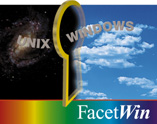

Advanced Server for UNIX versus FacetWin
Background
- Advanced Server for UNIX (ASU) is an AT&T port of the Microsoft NT SMB
(CIFS) server, security, domain control, and name service source code to
UNIX.
- Historically, Microsoft would release an NT version (e.g. 3.51). AT&T
had a source license and would take the source code and port it to generic
UNIX. [Note that in this process, AT&T had to make all the same kind of
implementation decisions that we have regarding how to fit
Microsoft unique concepts into a UNIX environment]. This initial porting
process usually took about 9-12 months after the Microsoft public release.
Then AT&T would release their ASU port to their OEM customers (Digital, HP,
DG, Bull, SNI, and SCO). At this point, each computer manufacturer would
take the code and port it onto their specific platform(s) and add their
vendor specific code. This process also usually took 9-12 months,
depending on the vendor. So roughly 1 and a half to 2 years after
Microsoft released the software, the OEM's would have their port available
for their customers.
- With the pending release of NT 5.0 (now Windows 2000), Microsoft would
no longer release the source code to AT&T. Litigation ensued and a private
settlement was reached between AT&T and Microsoft in 9/98. While the outcome of
this is not public, it appears that ASU is now dead. AT&T did not even attend the CIFS
technology conference in 10/98. As you know, Sun has recently announced
Cascade as an ASU port to their platform. It is unclear to us if this is
based on NT4 or NT5 (it is possible that they cut some kind of bilateral deal with
Microsoft), but the industry is skeptical about what they are doing.
Computergram says (9/9/98) industry executives who have tried selling
these ASU packages have concluded that the customer is almost always
better off financially just buying a commodity NT server box.
Why FacetWin vs. ASU
- ASU is dead and dead-ended.
- ASU is a PDC
- If the customer wants another Primary Domain Controller (PDC),
then they should buy a cost effective commodity NT box.
- If the customer wants the PC users to have file and printer
access to the robust, scalable, reliable (etc.) UNIX server(s),
then they should buy FacetWin.
- FacetWin is easy to install, administer and use. ASU is not.
- FacetWin is native UNIX code, not a port of Windows code. We had the
benefit of addressing the issues of mapping Windows features onto UNIX
directly from a native UNIX perspective. This has resulted in an
overall better solution for customers wanting access to UNIX files from
Windows.
- FacetWin code is current, not 18-24 months behind Microsoft work.
- FacetWin is available across all UNIX platforms. So customers with
mixed computing environments (pretty much all large customers) can be
sure that FacetWin will work on all of their UNIX platforms. ASU is limited
to certain computer suppliers, and future support is in doubt.
- FacetWin includes world-class terminal emulation, important for running
customers' character-based and other legacy UNIX applications. ASU does
not include a terminal emulator.

